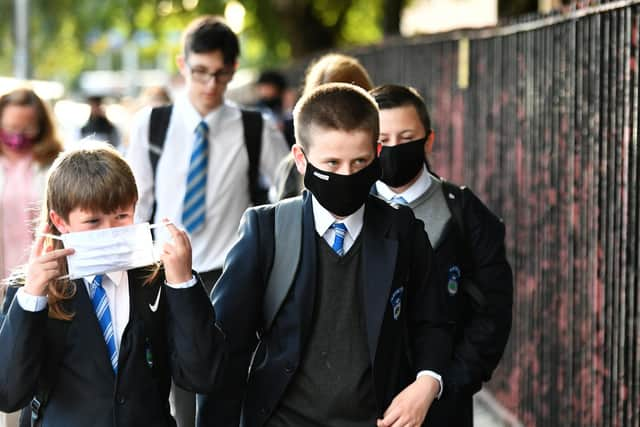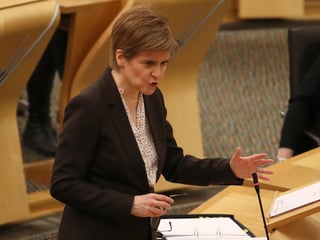Schools closed until mid-February at earliest, announces Nicola Sturgeon
Nicola Sturgeon has said that while the government had hoped to see the return of pupils on February 1, its “reluctant judgment” was to keep them closed for longer.
The move was welcomed by the largest teaching union, but organisations representing children with complex needs urged the government to allow special schools to reopen.
Advertisement
Hide AdAdvertisement
Hide AdAddressing MSPs in Holyrood Nicola Sturgeon said: “It is of course a priority for all of us to get children back to normal schooling as soon as possible.
“I know how much work teachers, school leaders and other staff are doing to support home learning and I am very grateful to them for that. But I also know just how challenging and stressful this situation is for families. And above all, I understand how difficult, distressing and damaging it is for children and young people to have their education and their normal interactions with friends so disrupted.
“However, our reluctant judgment is that community transmission of the virus is too high – and is likely to remain so for the next period – to allow a safe return to school on 1 February.”
She said all school and nursery premises will remain closed until mid-February, except for vulnerable and key worker children, and there would be a further review of closures on February 2.


“If it is at all possible, as I very much hope it will be, to begin even a phased return to in-school learning in mid-February, we will. But I also have to be straight with families and say that it is simply too early to be sure about whether and to what extent this will be possible.”
However Tory education spokesman Jamie Greene raised concerns about the impact of school closures on classroom standards.
“The Government has to ramp up efforts to prevent our most disadvantaged pupils falling further behind in their education,” he said. “Can I ask the First Minister to shed some more light on what this phased reopening of schools might actually look like and what criteria will need to be met for ministers to give the go ahead to get these young people back into the classroom where they belong?”
Ms Sturgeon said this would happen after the review on February 2 and added: “We will do everything we can to, at the very least begin a phased return from mid-February. Clearly we have the mid-term break in February and the days for that vary around the country.”
Advertisement
Hide AdAdvertisement
Hide AdResponding to the news of a longer shutdown, EIS General Secretary Larry Flanagan said it was the “correct decision”.
He added: “While the EIS wants to see schools fully operational as soon as possible, this can only be achieved when it is safe for all students and staff to return, which means full consideration of the evidence on the new variant and its transmissibility amongst young people.
“While home learning brings many challenges for pupils, parents and teachers, the indications are that the vast majority of students are engaging positively via remote learning with appropriate support from teachers, parents and carers. The EIS would call, however, for the rapid employment of supply teachers currently seeking work to provide additional support to those pupils struggling to engage with remote learning.”
Scottish Greens education spokesperson Ross Greer also called for the government to deliver on a proposed “package of school safety measures” now the schools were remaining closed for longer.
“Last week we saw progress on one of those proposals, with an extra £45 million to recruit desperately needed extra school staff,” he said. “To ensure our schools are as safe as possible and can reopen quickly though, we need to see real progress on the other measures already agreed by Parliament, particularly the delivery of mass voluntary testing for school staff and senior pupils.
“More urgently however is the need to provide digital support such as laptops to the young people and families who, nearly a year into this pandemic, are still excluded from online learning through no fault of their own.”
However the Scottish Children’s Services Coalition, an alliance of organisations campaigning to improve services for vulnerable children and young people has said the government should keep special needs schools open, with teachers and support staff given priority for vaccination.
It backed a call by Kindred, an advocacy organisation supporting parents of children with complex needs, which has written to the Scottish Government urging it to reopen special schools to full time-placements who want to return.
Advertisement
Hide AdAdvertisement
Hide AdIn England, Wales and Northern Ireland special schools have remained open, whereas in Scotland some local authorities have kept all special schools open while others offer pupils a few days at school each week, or no provision at all.
Kenny Graham from the SCSC said: “There is a current patchwork approach to opening special schools across Scotland and we fully add our support to this call by Kindred to ensure that these are fully reopened.
“Many of those we are supporting are finding the current situation incredibly challenging, with greatly increased social exclusion through being at home. The loss of routine has proven extremely difficult for many, impacting in many cases on both the children and their parents. It is vital for those who want to, that they have the opportunity to return to school and have full access to the care and support they feel they need.”
New parent lobby group UsForThem Scotland said it was “disappointed” in the news of longer closures. Organiser Jo Bisset added: “We completely understand these aren’t easy decisions for any government to make. This is a balance-of-harm consideration – yet both the Scottish and UK governments are choosing to burden our children with that harm.”
A message from the Editor:
Thank you for reading this article. We're more reliant on your support than ever as the shift in consumer habits brought about by coronavirus impacts our advertisers.
If you haven't already, please consider supporting our trusted, fact-checked journalism by taking out a digital subscription.
Comments
Want to join the conversation? Please or to comment on this article.
